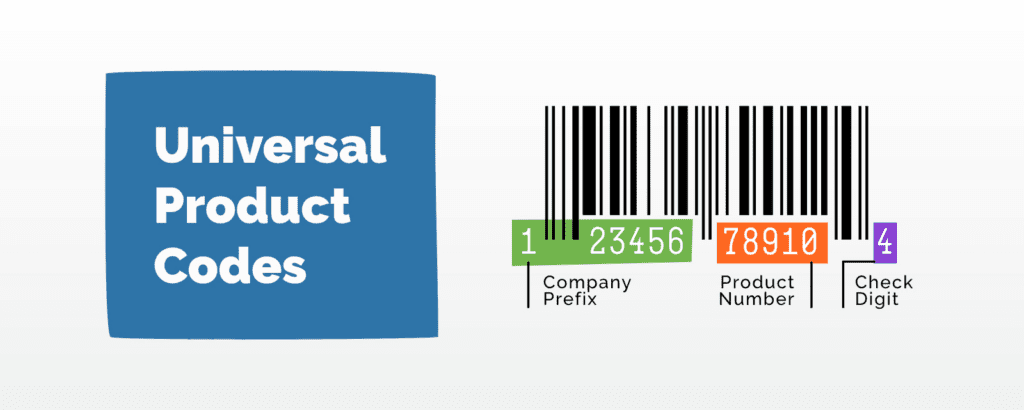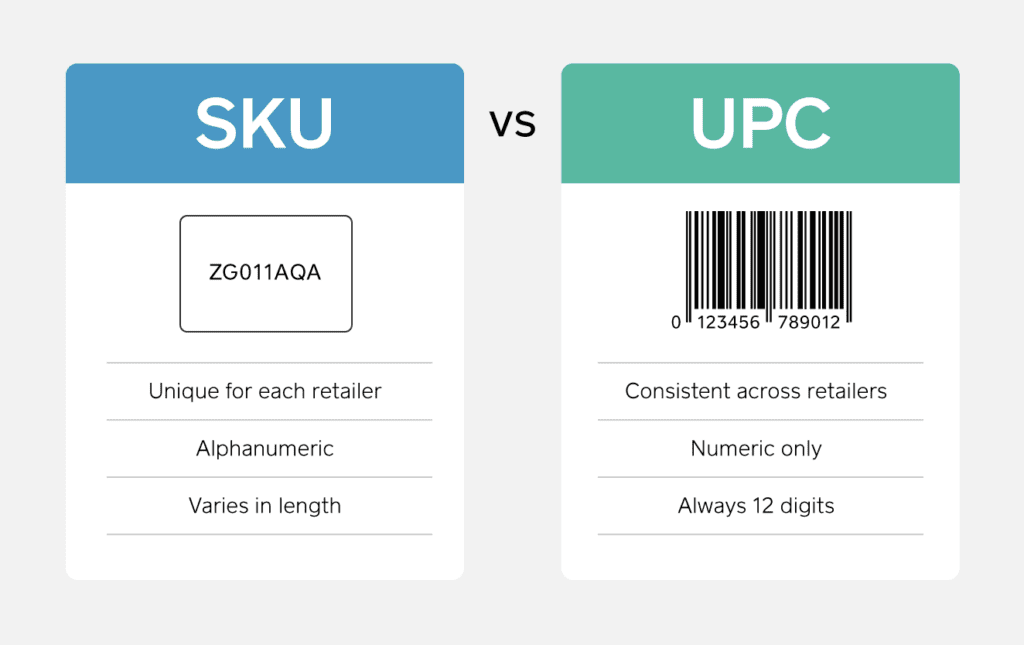
In the dynamic world of retail and e-commerce, the acronyms SKU and UPC often surface in discussions surrounding inventory management and product identification. Both play pivotal roles in streamlining operations and enhancing the customer shopping experience. However, the distinction between SKU (Stock Keeping Unit) and UPC (Universal Product Code) is crucial for businesses aiming to optimize their processes effectively.
In this exploration of “SKU vs. UPC: What’s the Difference?” we will delve into the unique functions and characteristics of these two identifiers.
What is a stock keeping unit (SKU)?

A Stock Keeping Unit, commonly known as SKU, is a unique code or identifier assigned to a specific product or item in a retailer’s inventory. SKUs are used for internal tracking and management purposes, allowing businesses to efficiently monitor and control their inventory.
What is a universal product code (UPC)?

A Universal Product Code (UPC) is a standardized barcode symbology widely used for product identification in the retail and manufacturing industry. UPC barcodes are unique 12-digit codes assigned to individual products to facilitate their tracking, sales, and inventory management. These codes are essential for streamlining point-of-sale transactions, automating inventory processes, and enhancing overall supply chain efficiency.
SKU vs. UPC: What’s the Difference?

SKU (Stock Keeping Unit) and UPC (Universal Product Code) are both product identifiers used in the retail industry, but they serve different purposes and are designed for distinct stages in the supply chain. Here’s a breakdown of the key differences between SKU and UPC:
Purpose:
- SKU (Stock Keeping Unit): Primarily used for internal purposes, SKUs help businesses manage and track their inventory efficiently. SKUs are unique to each business and can be customized to reflect various product attributes like size, color, style, and more.
- UPC (Universal Product Code): Designed for external use, UPCs are standardized codes used for product identification during retail transactions. They streamline the checkout process, help in pricing, and provide a universal language for communication between manufacturers and retailers.
Uniqueness:
- SKU: Uniqueness is maintained within the business; two different companies may use the same SKU for different products. SKUs can be alphanumeric and are specific to the company’s internal tracking needs.
- UPC: Globally unique, ensuring that no two products anywhere in the world have the same UPC. This universal uniqueness is crucial for consistency in retail operations.
Standardization:
- SKU: There is no universal standard for SKUs. Each business can create its own SKU system based on its operational needs.
- UPC: Follows a global standard set by the GS1 organization, providing consistency and interoperability across different retailers and industries.
Usage:
- SKU: Used for internal inventory management, tracking sales performance, and facilitating efficient reordering within a specific business.
- UPC: Used externally in retail operations, scanned during the checkout process to retrieve product information, and facilitate accurate and rapid transactions.
Flexibility:
- SKU: Offers flexibility for businesses to design their own coding system based on their specific requirements and organizational structure.
- UPC: Follows a rigid 12-digit format globally, limiting customization but ensuring a standardized approach for all products using UPC.
In summary, while both SKU and UPC play crucial roles in the retail supply chain, SKU is more internal and customizable, tailored to a specific business’s needs, whereas UPC is external, standardized globally, and designed for universal product identification and retail transactions.
How do you track SKUs and UPCs?
Tracking SKUs (Stock Keeping Units) and UPCs (Universal Product Codes) is integral to efficient inventory management and streamlined retail operations. Here are five common methods for tracking SKUs and UPCs:
Inventory Management Systems
Implementing dedicated inventory management systems is a popular and effective way to track SKUs and UPCs. These systems automate various aspects of inventory control, including tracking stock levels, monitoring sales, and generating reports. Many systems allow businesses to assign unique SKUs to products and integrate UPC barcodes for accurate identification.
Barcoding Systems
Barcoding systems play a crucial role in tracking both SKUs and UPCs. Barcodes, especially UPC barcodes, are unique identifiers for products and can be scan at various points in the supply chain. Barcoding systems enhance accuracy, reduce manual errors, and expedite tasks like stocktaking and order fulfillment.
Enterprise Resource Planning (ERP) Software
ERP software integrates various business processes, including inventory management. These systems often include modules for SKU and UPC tracking. Businesses can assign SKUs, generate UPCs, and seamlessly track products from procurement to sale using ERP software.
Manual Tracking Systems
Smaller businesses or those with simpler inventory needs may opt for manual tracking systems using spreadsheets or databases. Each product is assigned a SKU, and corresponding UPCs are enter and track manually. While this approach is more labor-intensive, it can be cost-effective for businesses with lower transaction volumes.
Cloud-Based Platforms
Cloud-based platforms provide flexibility and accessibility for tracking SKUs and UPCs. These platforms often offer real-time updates, collaboration features, and integration with other business tools. Cloud-based solutions are particularly beneficial for businesses with multiple locations or an online presence.
In selecting a tracking method, businesses should consider factors such as the scale of operations, the complexity of inventory, and the level of automation required. Combining technologies like barcoding and dedicated inventory management systems can provide a comprehensive solution for accurate SKU and UPC tracking.